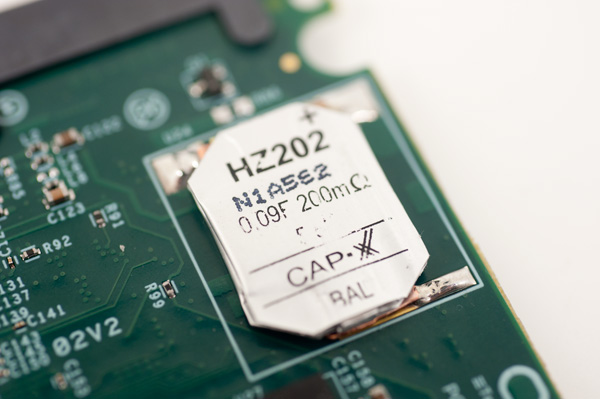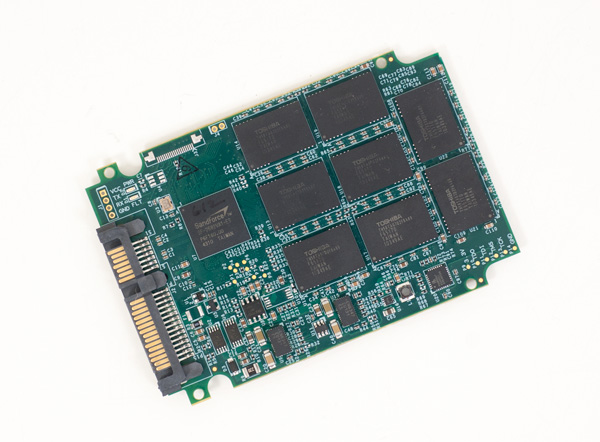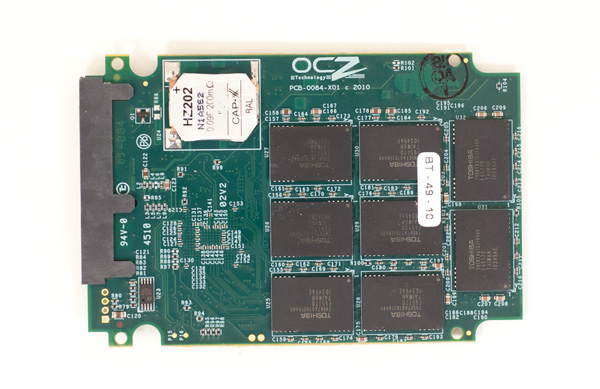OCZ Vertex 3 Pro Preview: The First SF-2500 SSD
by Anand Lal Shimpi on February 17, 2011 3:01 AM ESTToday: Toshiba 32nm Toggle NAND, Tomorrow: IMFT 25nm
The Vertex 3 Pro sample I received is a drive rated at 200GB with 256GB of NAND on-board. The SF-2682 controller is still an 8-channel architecture and OCZ populates all 8 channels with a total of 16 NAND devices. OCZ selected Toshiba 32nm Toggle Mode MLC NAND for these early Vertex 3 Pro samples however final shipping versions might transition to IMFT 25nm. The consumer version (Vertex 3) will use IMFT 25nm for sure.
Each of the 16 NAND devices on board is 16GB in size. Each package is made up of four die (4GB a piece) and two planes per die (2GB per plane). Page sizes have changed. The older 34nm Intel NAND used a 4KB page size and a 1MB block size. For Toshiba's 32nm Toggle NAND pages are now 8KB and block size remains unchanged. The move to 25nm will finally double block size as well.
Remember from our earlier description of SandForce's architecture that its data redundancy requires a single die's worth of capacity. In this case 4GB of the 256GB of NAND is reserved for data parity and the remaining 66GB is used for block replacement (either cleaning or bad block replacement). The 200GB drive has a 186GB formatted capacity in Windows.
This is a drive with an enterprise focus so the 27.2% spare area is not unusual. You can expect the consumer versions to set aside less spare area, likely at little impact to performance.

The 0.09F supercap, a feature of the enterprise level SF-2500 controller. This won't be present on the client Vertex 3.
The Vertex 3 Pro is still at least a month or two away from shipping so pricing could change, but right now OCZ is estimating sales at between $3.75 and $5.25 per GB. The client focused Vertex 3 will be significantly cheaper - I'd estimate somewhere north (but within range) of what you can currently buy Vertex 2 drives for.
| OCZ Vertex 3 Pro Pricing | |||||
| 100GB | 200GB | 400GB | |||
| MSRP | $525.00 | $775.00 | $1350.00 | ||
| Cost per GB | $5.35/GB | $3.875/GB | $3.375/GB | ||
Both the Vertex 3 and Vertex 3 Pro are expected to be available as early as March, however as always I'd be cautious in jumping on a brand new controller with brand new firmware without giving both some time to mature.












144 Comments
View All Comments
slickr - Thursday, February 17, 2011 - link
Now this is what I'm talking about about reviews/previews. Tons of benchmarks at various settings and loads. You can really make a difference now and see how the drives perform.I would also like a good old fashion test with Starcraft 2, how long it takes to load a 5-6mb custom map.
I would also like another test where you select 30 files and open them at the same time and see how much time it takes to open all. I'm talking about selecting few 3-5mb images, few MP4 360p videos, few H.264 720p videos, dozen office documents from 500kb up to 3mb, several applications like GPU-z, skype, Live, Xfire, firefox etc... and opening few highly compressed script files.
MamiyaOtaru - Thursday, February 17, 2011 - link
smaller process, less reliability, and higher price? We've been waiting for years fr prices to become reasonable next to magnetic storage but there's been barely a drop at all, and the drops that do come (smaller processes, supposedly) reduce reliability. At this point I don't see myself ever getting one for my desktop.Laptops sure, hard drives die there all the time, and I don't use them as my primary machine. Smaller storage requirements + hard drives dying far more often in laptops makes SSDs the better choice for me there.
Chloiber - Thursday, February 17, 2011 - link
I do generally agree. I don't want faster drives, I want cheaper drives. They are already very fast. Of course, faster is always better but at the moment I prefer low price and reliabilty over speed.seapeople - Friday, February 18, 2011 - link
Seriously... I don't need a brand new controller that might or might not be reliable and is so fast that it would still seem fast if I taped myself using the computer and replayed it in slow motion. What I want is an x25m-like drive at 160 GB for under $200. Still extremely fast, legendary (for SSD's) reliability, and make it affordable.The reason I don't buy Ferrari's right now is not because I don't think they're fast enough, it's because they COST too much.
RU482 - Thursday, February 17, 2011 - link
this might be the problem with OCZ. They are an SSD marketing company with a manufacturing divisionTimK - Thursday, February 17, 2011 - link
Damn, Anand, so this is what an engineering degree will get you, not to mention some heavy duty skill at writing. Comprehensive and comprehensible. Thanks very much. At your recommendation I bought an early Vertex 30GB SSD for my unibody MacBook. From time to time I take it out, thinking to have everything in one place on a bigger drive, but I just can't let go of the speed. It's still working great.dlang1234 - Thursday, February 17, 2011 - link
The Samsung 470 seems to be in a lot of the benchmarks but not all, and seems to do well in every one that it is listed in.I can't seem to find a review of it here, but would be interested in it possibly.
markjx1 - Thursday, February 17, 2011 - link
No mention of the fact this thing was originally slated with the SF-2000 controller, which proved to be plagued with problems in the lab and the dirty little secret no vendor would discuss at CES which was why no one had anything SF-2000 based up and running. And now OCZ had to resort to slapping Sandforce's enterprise class SF-2500 controller on it.Great except its going to be hella expensive and not cost competitive with the Crucial C400 unless OCZ bleeds margin, and given they took a $25 million bank loan recently, well let's just say OCZ isn't a company I'd rely on to fulfill a warranty replacement a couple years down the road when your drive dies.
Lastly, notice the "hardware isn't final" disclaimers all over the article. This is nothing more than OCZ trying to get some buzz, and have painted themselves into a corner now if they go switching back to the SF-2000 since they've already set expectations high.
jwilliams4200 - Thursday, February 17, 2011 - link
I thought the article was fairly well done. The only problem I have with it is a passing mention to the SSD being unusuable on a Macbook Pro, and yet not a single benchmark shows any problems with the SSD. It seems the benchmark suite Anand is using needs to have some more components added. Perhaps a latency test?Anand Lal Shimpi - Sunday, February 20, 2011 - link
Check back on the site by the end of the week ;)Take care,
Anand